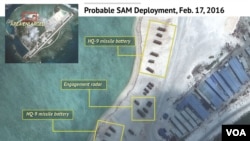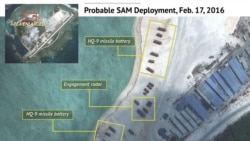Secretary of State John Kerry says the United States intends to engage in “very serious conversations” with China after civilian satellite imagery indicated that China deployed surface-to- air missiles on a contested island in the South China Sea. The island in question is Woody Island, part of the Paracel Island chain. The chain is claimed by China, Taiwan and Vietnam.
There is evidence every day that there has been an increase of militarization of one kind or another. It’s of serious concern.”U.S. Secretary of State John Kerry
China has said it will not militarize in the South China Sea, “but,” Mr. Kerry noted, “there is evidence every day that there has been an increase of militarization of one kind or another. It’s of serious concern,” he said.
China’s latest apparent move on Woody Island follows other dubious activities by China in the South China Sea in recent months. In addition to the Paracel Island chain, China also claims sovereignty over the disputed Spratly Islands, and, in an enormous dredging operation, has built several artificial islands in the area, some equipped with air strips, which observers say could be used for military purposes.
The United States takes no position on the sovereignty of disputed features in the South China Sea region, but has encouraged the countries involved to solve their disputes diplomatically and peacefully in accordance with international law.
In January, the U.S. Navy sent a ship near Triton island, part of the Paracel Island chain, in order, said the U.S. Department of Defense, to challenge "excessive maritime claims that restrict the rights and freedoms of the United States and others."
During a press conference at the conclusion of the recent U.S .- ASEAN summit in California, President Barack Obama underscored the U.S. and ASEAN’s “strong commitment to a regional order where international rules and norms and the rights of all nations, large and small are upheld.” Toward that end, President Obama emphasized “the need for tangible steps in the South China Sea to lower tensions, including a halt to further reclamation, new construction and militarization of disputed areas.” He added that “Freedom of navigation must be upheld and lawful commerce should not be impeded.”
“The United States,” said President Obama, “will continue to fly, sail, and operate wherever international law allows, and we will support the right of all countries to do the same.”






